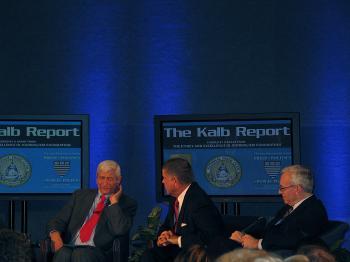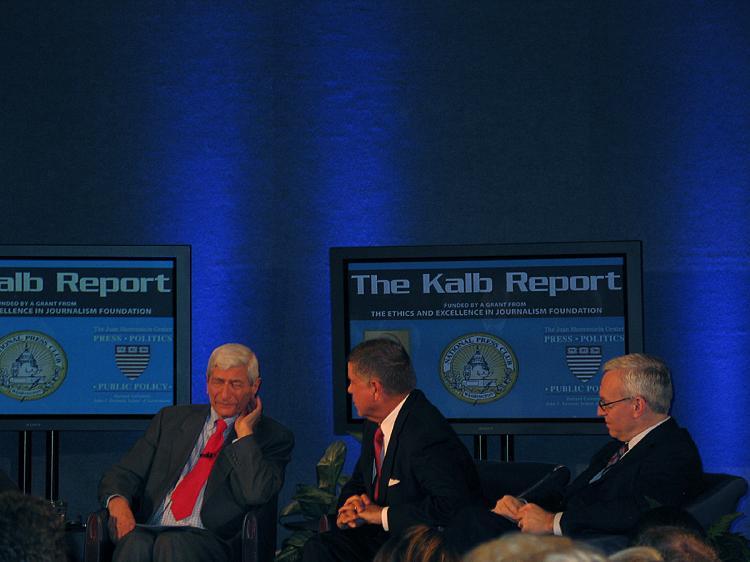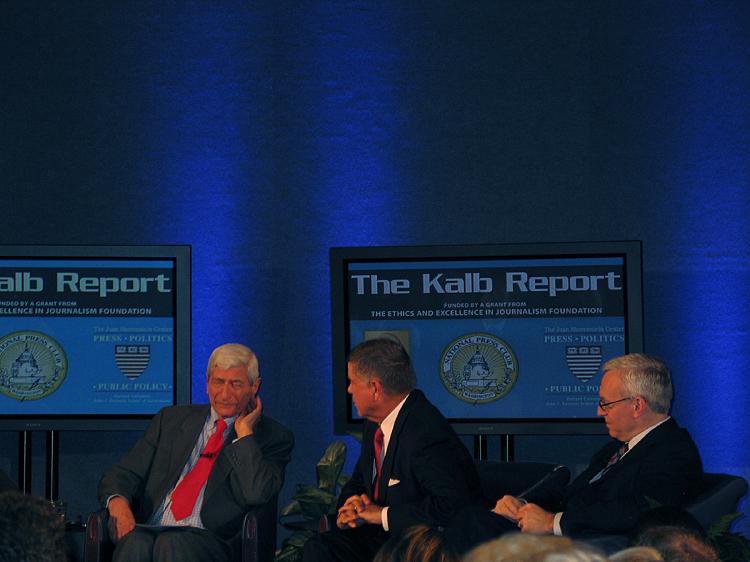Many community newspapers throughout the United States have also ceased publishing or drastically reduced their circulation. Many attribute this decline in part to a failed newspaper business model that has not evolved with the changes in audience news-viewing behaviors.
“The world is changing and there are many other ways evolving for humans to commit journalism,” said Jon Klein, president of CNN.
“The market for news is growing, more people are seeking content more times a day in more countries today than ever before. This is not about a declining market, it’s about a growing market, but the problem is that revenue is going in a different direction,” said Tom Curley, president and CEO of the Associated Press.
Klein and Curley spoke March 23, at a forum, “Down to the Wire: Journalism in Crisis,” a discussion with Marvin Kalb for the Kalb Report. A few of the largest and most influential U.S. news organizations were represented at this Washington forum that also included Alberto Ibargüen, president and CEO of the Knight Foundation, and Vivian Schiller, president and CEO of National Public Radio (NPR).
These influential news media leaders discussed the current state of the U.S. news industry which has been recently marked by the decline and closing of metropolitan newspapers and smaller news publications.
“I think the bigger conceptual issue that is very hard if you come from a traditional media to figure out is … the psychological shift from a news consumer to a news user. The people who used to sit down and read the newspaper or watch TV had that kind of: ‘I write, you read’ mentality, [where] you [passively] receive the information. I think the user of information in the next generation expects to be able to participate in the construction of the information or use it in some interactive way,” said Alberto Ibargüen.
Klein reported that CNN is the number one accessed news website and among the top choice for individuals to access new wirelessly. Leading the new wave of journalism, CNN has created interactive features on its website including the I Report, which allows for citizen journalism. CNN is also developing a service similar to a wire service, which it hopes to launch this year.
“We have got people generating journalism throughout the day, 24 hours a day. What we have begun to do is have conversations with newspaper editors, television stations owners, radio station owners, to see what needs they perceive out there and whether there is a match. And we are seeing some early interest. We just have to shape the product to fit the needs of the potential customer,” said Klein.
The decline of the print news print medium has many wondering who will fill the void of the print media, reporting on what is happening in local communities, providing in-depth articles, investigative reports, and serving as a watchdog.
“I agree that we do need to let go of newsprint, but I think what newspapers have that I don’t see existing very well in any other media, is true … investigative reporting; there are pockets of it, you at CNN do a little bit, we do little bit, there are, of course, wonderful television programs like “60 Minutes,” “Frontline” and some online investigative reporting, but I really fear for the absence of that, and worry [for] that type of reporting that newspapers have dominated,” said Vivian Schiller of NPR
Senator Cardin’s Proposal to Save the Newspaper
All of the participants agreed that the most immediate problem facing the news industry is the issue of lost revenue. One day following this discussion, Senator Benjamin Cardin (D-MD) announced legislation he proposed that would allow failing newspapers non–profit status to continue operation.
“We are losing our newspaper industry,” said Senator Benjamin Cardin in a press release issued by his office. “The economy has caused an immediate problem, but the business model for newspapers, based on circulation and advertising revenue, is broken, and that is a real tragedy for communities across the nation and for our democracy.
The Newspaper Revitalization Act would allow newspapers to restructure as non-profits, under 501(c)(3) status for educational purposes, similar to public broadcasting. Under this arrangement, newspapers would not be allowed to make political endorsements, but would be allowed to freely report on all issues, including political campaigns. Advertising and subscription revenue would be tax exempt and contributions to support coverage or operations could be tax deductible.
The measure aims to preserve local newspapers serving communities. Because newspaper profits have been falling in recent years, no substantial loss of federal revenue is expected.
“We are never going to have a shortage of people wanting to find things out, and wanting to tell others about them, and we are not going to have a shortage of people who want to know what’s going on. In that sense, we are all pretty well positioned, we just need to think about how to take advantage of it,” said Klein.




